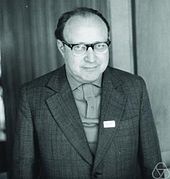Eugene Dynkin
Eugene B. Dynkin (originally Evgeni Borissowitsch Dynkin / Russian Евгений Борисович Дынкин ; born May 11, 1924 in Leningrad ; † November 14, 2014 in Ithaca , New York ) was a Russian mathematician .
Life
Dynkin was of Jewish origin. In 1935 his father was declared an " enemy of the people " and the family was exiled to Kazakhstan . Two years later, the father died in the gulag . Despite this double burden (Jewish ancestry and political problems), Dynkin was admitted to Lomonosov University in Moscow in 1940 , where he began studying mathematics . He was spared from military service in World War II because of eye problems.
Dynkin could only assert himself at the university through the intercession of Andrei Nikolajewitsch Kolmogorow . He visited u. a. Seminars with Kolmogorow and Israel Gelfand . In 1945 he received his diploma, continued to work under Kolmogorow and received his doctorate in 1948. He then became an assistant professor to Kolmogorow at Lomonosov University , but also after his doctorate in physics and mathematics in 1951, which corresponds to a habilitation in the West, the party leadership of the university wanted him not assign a full professorship. This did not happen until 1954 after Stalin's death and Kolmogorov's renewed strong intercession.
In 1968 he had to give up his professorship at Lomonosov University and moved to the Institute of Economics and Mathematics of the Russian Academy of Sciences as head of a research group . After his only daughter had already gone to Israel , Dynkin emigrated to the USA in 1976 . In 1977 he became a professor at Cornell University in Ithaca , and from 1989 as A. R. Bullis professor of mathematics.
plant
In the 1940s Dynkin began his mathematical work with work on Lie groups , for which he developed the Dynkin diagram , and came to probability theory thanks to Kolmogorov . In the latter he made significant contributions to the theory of the Markov chains . During his phase at the Academy of Sciences, he worked on economic equilibria and growth processes . In the USA he returned to the Markov chains and connected them with random fields , partial differential equations and quantum field theory . The terms Dynkin system (from measure theory ), Dynkin diagram (from the theory of Lie algebras ) and the Doob-Dynkin lemma are associated with his name. In representation theory , the Dynkin index is named after him.
With Wladimir Andrejewitsch Uspenski he also wrote the three-volume Mathematical Entertainments (Volume 1 Multicolor Problems, Volume 2 Number Theory, Volume 3 Odds), which were also published in German in 1955 (VEB Verlag der Wissenschaften, Berlin).
His doctoral students include Friedrich Karpelewitsch , Alexander Adolfowitsch Juschkewitsch , Nikolai Nikolajewitsch Tschenzow , Anatoli Skorochod , Ernest Vinberg and Arkadi Onishchik .
Honors
Dynkin received the 1951 Prize of the Moscow Mathematical Society and in 1993 the Leroy P. Steele Prize of the American Mathematical Society , of which he was a fellow. He was a member of the American Academy of Arts and Sciences (1978), National Academy of Sciences of the USA (1985), honorary member of the Moscow Mathematical Society (1995). He received honorary doctorates from the Université Pierre et Marie Curie in Paris (1997), the University of Warwick (2003) and the Independent University of Moscow (2003). In 1962 he gave a plenary lecture at the International Congress of Mathematicians in Stockholm (Markov Processes and Problems of Analysis) and in 1970 he was invited speaker at the ICM in Nice (Entrance and exit spaces for a Markov process) , but was unable to give the lecture in either case hold himself as he did not receive an exit permit.
Fonts
- Mathematical conversations, exercises on the multicolor problem, from number theory and probability theory, VEB Deutscher Verlag der Wissenschaften, Berlin, 1955–1956 (and more often, 5th edition 1983)
- The basics of the theory of Markoff processes , basic teaching of the mathematical sciences , Springer Verlag 1961
- Markov Processes, 2 volumes, Basic Teachings of Mathematical Sciences , Springer Verlag 1965
- Sentences and exercises about Markoff's processes, Springer Verlag 1969
- with Alexander Adolfowitsch Juschkewitsch : Controlled Markov Processes, Basic Teachings of Mathematical Sciences , Springer Verlag 1979
- Markov Processes and Related Problems of Analysis, Selected Papers, London Math. Soc., Lecture Notes Series, 54; Cambridge University Press, 1982
- AA Yushkevich, GM Seitz, AL Onishchik (editors): Selected Papers of EB Dynkin with Commentary, American Mathematical Society, 2000
- Diffusions, Superdiffusions and Partial Differential Equations, AMS Colloquium Publications 2002
- Superdiffusions and Positive Solutions of Nonlinear Partial Differential Equations, American Mathematical Society 2004
literature
- Eugene B Dynkin, 1993 Steele Prizes, Career Award, Notices of the American Mathematical Society 40 (1993): 975-977.
- RL Dobrushin, AL Onishchik, VA Uspenskii and ND Vvedenskaya, Evgenii Borisovich Dynkin (on his seventieth birthday), Russian Mathematical Surveys 49 (4) (1994), 183-191.
- MI Freidlin, EB Dynkin, in The Dynkin Festschrift, Markov Processes and their Applications (Boston 1994), ix-xvi.
Web links
- Literature by and about Eugene Dynkin in the catalog of the German National Library
- Dynkins Homepage in Cornell (English)
- John J. O'Connor, Edmund F. Robertson : Eugene Dynkin. In: MacTutor History of Mathematics archive .
Individual evidence
- ↑ Евгений Борисович Дынкин (11 мая 1924 - 14 ноября 2014)
- ↑ Eugene Dynkin in the Mathematics Genealogy Project (English)
| personal data | |
|---|---|
| SURNAME | Dynkin, Eugene |
| ALTERNATIVE NAMES | Dynkin, Eugene B .; Dynkin, Evgeni Borissowitsch (maiden name); Евгений Борисович Дынкин (Russian); Dynkin, Eugene Borisovich (English transliteration) |
| BRIEF DESCRIPTION | Russian mathematician |
| DATE OF BIRTH | May 11, 1924 |
| PLACE OF BIRTH | Leningrad |
| DATE OF DEATH | November 14, 2014 |
| Place of death | Ithaca , New York |
